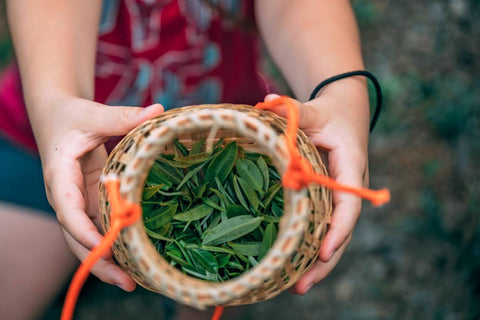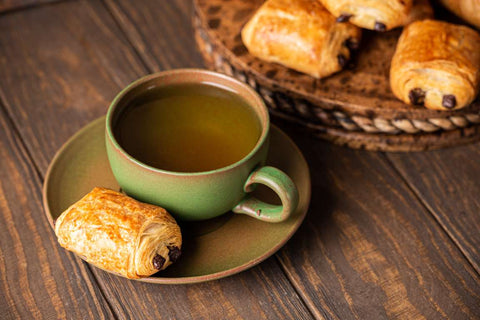Tea isn’t just about enjoying a cup of warmth; it can also be a reflection of responsibility toward the environment and communities. With rising concerns about environmental sustainability and social justice, brands like Inherigin are stepping up to incorporate eco-friendly farming methods. From organic tea agriculture to waste reduction and community empowerment, here's how sustainable tea brands like Inherigin are fostering greener and fairer practices.
What Does Sustainability Mean in Tea?
Sustainability in tea production means ensuring that the process of growing, harvesting, and distributing tea respects environmental limits while improving the lives of tea plantation workers who produce it. This can be broken into three primary categories:
-
Environmental Sustainability: This involves using farming practices that protect natural resources, reduce pollution, and enhance biodiversity.
-
Social Sustainability: Focuses on improving working conditions, ensuring fair pay, and empowering communities, particularly for tea farmers.
-
Economic Sustainability: This means ensuring long-term financial stability for tea growers without depleting the resources they depend on.
Every step of the tea production chain—from cultivation to packaging and shipping—has an impact. Sustainable brands like Inherigin take steps to reduce harm to both people and the planet while creating a high-quality product. Let’s dive into how these practices manifest in every aspect of tea production.

1. Regenerative Farming Practices
Conventional farming methods often rely on these chemicals, which can lead to soil degradation, water pollution, and harm to wildlife. Regenerative farming, by contrast, builds healthy soil by focusing on natural alternatives like compost, green manure, and crop rotation.
These practices lead to multiple benefits:
-
Healthier soil: Organic farming maintains nutrient-rich soil, preventing erosion and ensuring long-term productivity.
-
Cleaner water: Without the use of synthetic chemicals, organic farms don’t release harmful runoff into nearby streams and rivers.
-
Better biodiversity: Organic fields often host a greater variety of plants and insects, helping to keep ecosystems balanced.
Some brands, including Inherigin, take it a step further with regenerative farming. This approach focuses not just on avoiding harm but on actively improving the land. It includes practices such as:
-
Cover cropping: Growing specific crops that protect soil from erosion and enhance its fertility.
-
Agroforestry: Integrating trees into the tea plantation to improve biodiversity and provide natural shade, which reduces the need for irrigation.
-
Composting and manure management: Enriching the soil with organic matter, increases its ability to store carbon and reduces the need for chemical fertilizers.
This regenerative approach helps reverse damage from conventional farming, making the land more resilient to climate change while improving tea quality.
2. Preserving Biodiversity and Ecosystem Health
Tea plantations are traditionally monocultures, meaning they grow only one crop, which can lead to a significant loss of biodiversity. Sustainable tea brands counter this by adopting practices that promote biodiversity and ecosystem health. One method is agroforestry, where tea is grown alongside other plants and trees. This creates a more varied and balanced ecosystem.
Agroforestry offers several environmental benefits:
-
Shade-grown tea: Tea plants grown under the canopy of trees require less water and are less vulnerable to pests, reducing the need for irrigation and pesticides.
-
Habitat protection: By planting native trees and shrubs around tea farms, sustainable farms provide habitats for birds, insects, and other wildlife.
-
Soil protection: Tree roots help hold soil in place, preventing erosion and improving its ability to absorb and retain water.
Biodiversity also leads to natural pest control. The more diverse a farm's ecosystem, the more likely it is to contain natural predators that help keep harmful pests in check. This reduces the need for chemical pesticides and further protects the environment while supporting ethical tea practices.
3. Water Conservation Efforts
Water is essential for growing tea, and many tea-producing regions face increasing water stress due to climate change. Eco-friendly tea brands like Inherigin are adopting water conservation techniques to use this resource wisely.
Some methods of reducing water use include:
-
Drip irrigation: Instead of spraying water over large areas, drip irrigation delivers water directly to the roots of the tea plants, minimizing waste. This method can reduce water usage by up to 60%.
-
Rainwater harvesting: Many sustainable farms collect and store rainwater to use during dry periods. This reduces the strain on local water supplies and ensures that farms have access to clean water throughout the year.
-
Mulching: By covering the soil with organic material like leaves or straw, farmers can retain soil moisture and reduce the need for frequent watering.
Water conservation also extends to wastewater management in tea processing facilities. Some sustainable brands have installed systems that recycle wastewater, reducing the overall environmental impact of tea production.
4. Fair Trade and Ethical Sourcing
Tea farming has long been associated with exploitative labor practices, but sustainable brands are working to change that through fair trade and ethical sourcing initiatives. Brands like Inherigin ensure that tea workers are paid fairly and work under safe conditions. These initiatives also guarantee that farmers receive fair prices for their crops, helping them maintain a stable income even when global tea prices fluctuate.
Fairtrade certification also promotes:
-
Empowerment of local communities: By reinvesting in local infrastructure such as schools, healthcare, and clean water projects.
-
Child labor prevention: Ensuring that children are not exploited in tea production.
-
Direct trade models: Some brands cut out the middleman, purchasing tea directly from farmers, allowing them to earn more for their work. This direct relationship fosters transparency and ensures that consumers know exactly where their tea comes from.
Additionally, fair trade supports gender equality, as women make up a significant portion of tea workers. Many fair trade initiatives focus on improving the economic empowerment and leadership opportunities for women in farming communities.

5. Reducing Pesticides and Microplastics
Pesticide use is one of the biggest concerns in tea production. Non-organic farms often use synthetic pesticides to keep pests at bay, but these chemicals can leave residues on the tea leaves and seep into the environment. Eco-friendly tea brands like Inherigin eliminate this problem by adhering to organic farming standards, which prohibit the use of harmful pesticides and fertilizers.
Eco-conscious tea brands like Inherigin address this concern by prioritizing biological pest control over traditional pesticide-heavy methods. Instead of relying solely on synthetic pesticides, we incorporate natural solutions like introducing beneficial insects to manage pests and companion planting to protect crops. While some pesticide use is necessary, we conduct batch pesticide testing to ensure that every batch meets strict safety standards, making our tea both safe to consume and environmentally responsible.
Another issue is microplastics, which can be found in the packaging of conventional tea. Many tea bags are made from plastic or include plastic components that break down into tiny particles, contaminating both the tea and the environment. Sustainable brands are moving toward plastic-free tea bags and unbleached tea bags, using materials like compostable corn starch or biodegradable paper. This prevents microplastics from ending up in the final brew or being released into nature.
6. Supporting Farmers’ Cooperatives and Local Communities
Many sustainable tea brands collaborate with farmers’ cooperatives, which allow small farmers to pool resources and work collectively. Cooperatives help farmers access better markets, share knowledge, and secure higher prices for their products.
Inherigin works with cooperatives to:
-
Provide fair pricing: Farmers are paid fairly for their work, even during times of market instability.
-
Encourage collective decision-making: Farmers have a say in how the cooperative operates, ensuring their needs are met.
-
Invest in local infrastructure: Cooperatives often fund community projects like schools, health clinics, and clean water systems, improving the overall quality of life for farmers and their families.
Cooperatives also play a critical role in advancing climate resilience. By sharing knowledge about sustainable farming techniques and pooling resources for infrastructure improvements, cooperatives help farmers adapt to the challenges posed by climate change.

FAQs on Sustainable Tea Brands and Practices
What is sustainable tea?
Sustainable tea refers to tea produced in ways that prioritize environmental health, social equity, and economic viability. This means using eco-friendly farming practices, like organic cultivation, that minimize harm to the environment and protect biodiversity. Sustainable tea also supports fair labor practices, ensuring that workers receive fair wages and work in safe conditions. The goal is to create a positive impact on the planet and the communities involved in the tea business.
What is a fairtrade tea?
Fairtrade tea is tea produced under Fairtrade standards, which ensure fair wages and safe working conditions for farmers. This means that farmers receive fair pay and work in safe environments. Additionally, profits from Fair Trade-certified tea often support local initiatives, such as education and healthcare, contributing to community development. Fairtrade practices also promote environmental sustainability by encouraging eco-friendly farming methods that reduce the use of harmful pesticides. The system emphasizes transparency, allowing consumers to trace where their tea comes from and how it’s produced. By choosing Fair Trade tea, consumers help empower smallholder farmers and promote ethical production practices that benefit both people and communities.
What are sustainable tea bags made of?
Sustainable tea bags are typically made from biodegradable or compostable materials. Common materials include:
-
Paper: Unbleached, natural paper is often used and can be composted after use.
-
Cornstarch-based materials: INHERIGIN uses cornstarch-based materials which are compostable and break down naturally.
-
Hemp or cotton: These natural fibers are also used in some reusable tea bags, making them a sustainable option.
It's important to check the packaging or product description to ensure the tea bags are plastic-free and environmentally friendly.
Is drinking tea sustainable?
Drinking tea can be sustainable, especially when choosing brands that prioritize eco-friendly practices and ethical sourcing. The sustainability of tea largely depends on how it is produced and processed. By opting for organic, fair trade, and sustainably sourced tea, consumers can support practices that protect the environment and promote fair treatment of workers. Additionally, using reusable tea bags or loose-leaf tea can further reduce waste and support sustainability efforts.
How do you drink tea sustainably?
To enjoy tea sustainably, consider the following tips:
-
Choose sustainable brands: Look for teas that value fair trade or made by companies with strong sustainability practices.
-
Use loose-leaf tea: This often reduces packaging waste and can be more environmentally friendly than traditional tea bags.
-
Opt for reusable tea bags: If you prefer bagged tea, choose reusable bags made from natural materials that can be washed and used multiple times.
-
Minimize waste: Compost used tea leaves and tea bags (if compostable) to reduce landfill waste.
-
Be mindful of water usage: Boil only the amount of water you need for your tea to conserve energy and water.
-
Consider eco-friendly brewing methods: Use energy-efficient kettles or stovetops, and avoid single-use products like disposable cups.
By following these steps, you can enjoy your tea while being kind to the planet.
Final Thoughts on How Inherigin and Other Sustainable Tea Brands Support Eco-Friendly Farming Practices
Sustainable tea farming goes beyond simply producing tea and promoting its health benefits; it’s about safeguarding the environment, empowering farmers, and fostering healthy ecosystems. Brands like Inherigin are leading the way by sustainable and regenerative farming methods, conserving water, reducing waste, and ensuring fair treatment of workers. By supporting these brands, tea drinkers can help promote eco-friendly farming practices that protect the planet and benefit farming communities worldwide.
Inherigin supports sustainability by prioritizing regenerative farming practices, ensuring that our tea is grown without harmful pesticides and in ways that enhance soil health. Our brand is committed to fair trade principles, guaranteeing that farmers receive fair wages and work in safe conditions, while also investing in local community projects. Inherigin's dedication to zero-waste packaging and responsible sourcing reflects our broader mission to create a positive impact on both the environment and the lives of tea producers. By choosing Inherigin, you not only enjoy high-quality tea but also contribute to a more sustainable future.
Explore the delicious and ethically sourced green tea products from Inherigin today and join the movement for a greener planet!




